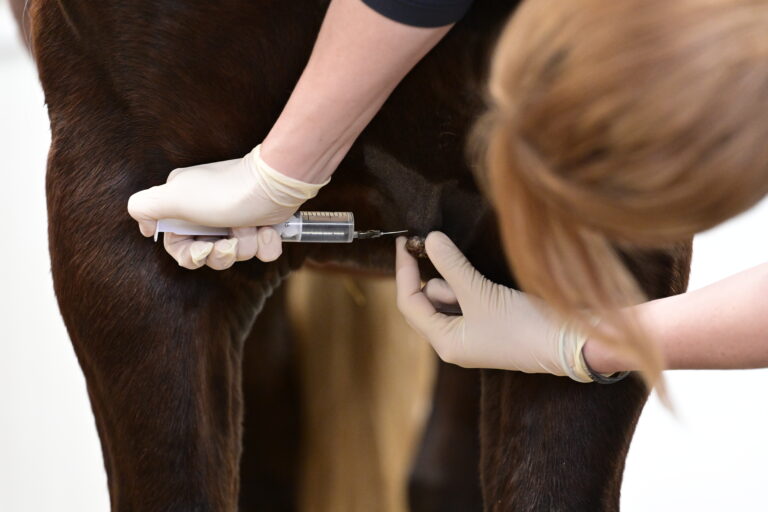
In this episode, Clare Ryan, DVM, PhD, DACVIM, joined us to discuss antimicrobial stewardship in equine practice. She explained why antimicrobial stewardship is important, offered suggestions for veterinarians interested in applying antimicrobial stewardship principles in their prescribing practices, and shared resources that are available to help.
This episode of Disease Du Jour is brought to you by Bimeda.
Why Is Antimicrobial Stewardship Important in Equine Practice?
“Antimicrobial resistance is everywhere,” said Ryan, noting that in human health care, it contributes to around 1.3 million deaths per year.
“There really is a direct link in many cases between some of those resistance mechanisms that are documented in infections in people, and some of the resistance mechanisms that we see consistently in bacteria from populations of horses,” she explained.
Ryan said there is documented resistance to all major antibiotic classes used in horses, and “there are a number of different conditions where we have over the years been able to document increasing amounts of resistance to antibiotics.” One of those conditions is Rhodococcus equi. “Our antimicrobial usage practices [for R. equi] very likely contributed to rapid development of resistance over a relatively short number of years,” she said.
Antimicrobial Stewardship Principles
Ryan then explained the three main antimicrobial stewardship principles she follows. The first principle is to reduce the incidence of disease through appropriate vaccination, husbandry, nutrition, and biosecurity. The second principle is to only use antimicrobials in situations where they are truly indicated. The third principle is to use antimicrobials appropriately when they are indicated.
“Some people will talk about the five Ds of antimicrobial therapy, and this would include using the right drug at the right dose for the right duration, using the right drug route of administration, and then deescalating our therapy,” Ryan said.
Ryan always recommends taking a culture when prescribing antimicrobials. “You don’t always have to submit it,” she said. “But if we have that sample in hand and have it appropriately stored in the refrigerator, then at least if our therapy is not working, then we may have the ability to submit that culture.”
Taking Steps to Practice Better Antimicrobial Stewardship
Ryan said antimicrobial stewardship often starts as an organic, underground movement within a practice. “You can start to make little changes,” she said. For example, practitioners can commit to carrying a weight tape and using it when prescribing antimicrobials to ensure they have the correct dose. Another tip Ryan recommended is finding a buddy in your practice and holding each other accountable to the antimicrobial stewardship guidelines.
Ryan reminded listeners that small steps make a difference. “I’m a huge fan of recognizing that perfection is maybe not on the table today,” she said. “Maybe I’m not going to meet every guideline and every goal perfectly today, but maybe I’m doing better than I was last week.”
Resources
Ryan recommended the following resources for veterinarians who want to learn more about antimicrobial stewardship:
- British Equine Veterinary Association. PROTECT ME, Antibiotic UseTool Kit: https://www.beva.org.uk/Resources-For-Vets-Practices/Medicines-Guidance/Protect-me
- Raidal, S. (2019), Antimicrobial stewardship in equine practice. Aust Vet J, 97: 238-242. https://doi.org/10.1111/avj.12833
About Dr. Clare Ryan
Clare Ryan, DVM, PhD, DACVIM, is an Assistant Professor with the Department of Infectious Diseases at the University of Georgia College of Veterinary Medicine. A board-certified specialist in large animal internal medicine, she brings a passion for equine health, pharmacodynamics of antibiotics, infectious disease, and clinical teaching to veterinary students and clients. After earning her DVM from the University of Wisconsin-Madison in 2002, she went on to complete a PhD at the University of Florida in 2010. Ryan is a Diplomate of the American College of Veterinary Internal Medicine and an active member of several professional organizations, including the American Association of Equine Practitioners and the Georgia Veterinary Medical Association.
Related Reading
- Merging Equine Clinical Practice and Antimicrobial Stewardship
- Investigating Antimicrobial Use at an Equine Veterinary Hospital
- Smart Antimicrobial Use in Equine Surgical Settings
Stay in the know! Sign up for EquiManagement’s FREE weekly newsletters to get the latest equine research, disease alerts, and vet practice updates delivered straight to your inbox.


![[Aggregator] Downloaded image for imported item #18890](https://s3.amazonaws.com/wp-s3-equimanagement.com/wp-content/uploads/2025/11/17113845/EDCC-Unbranded-3-scaled-1-768x512.jpeg)

